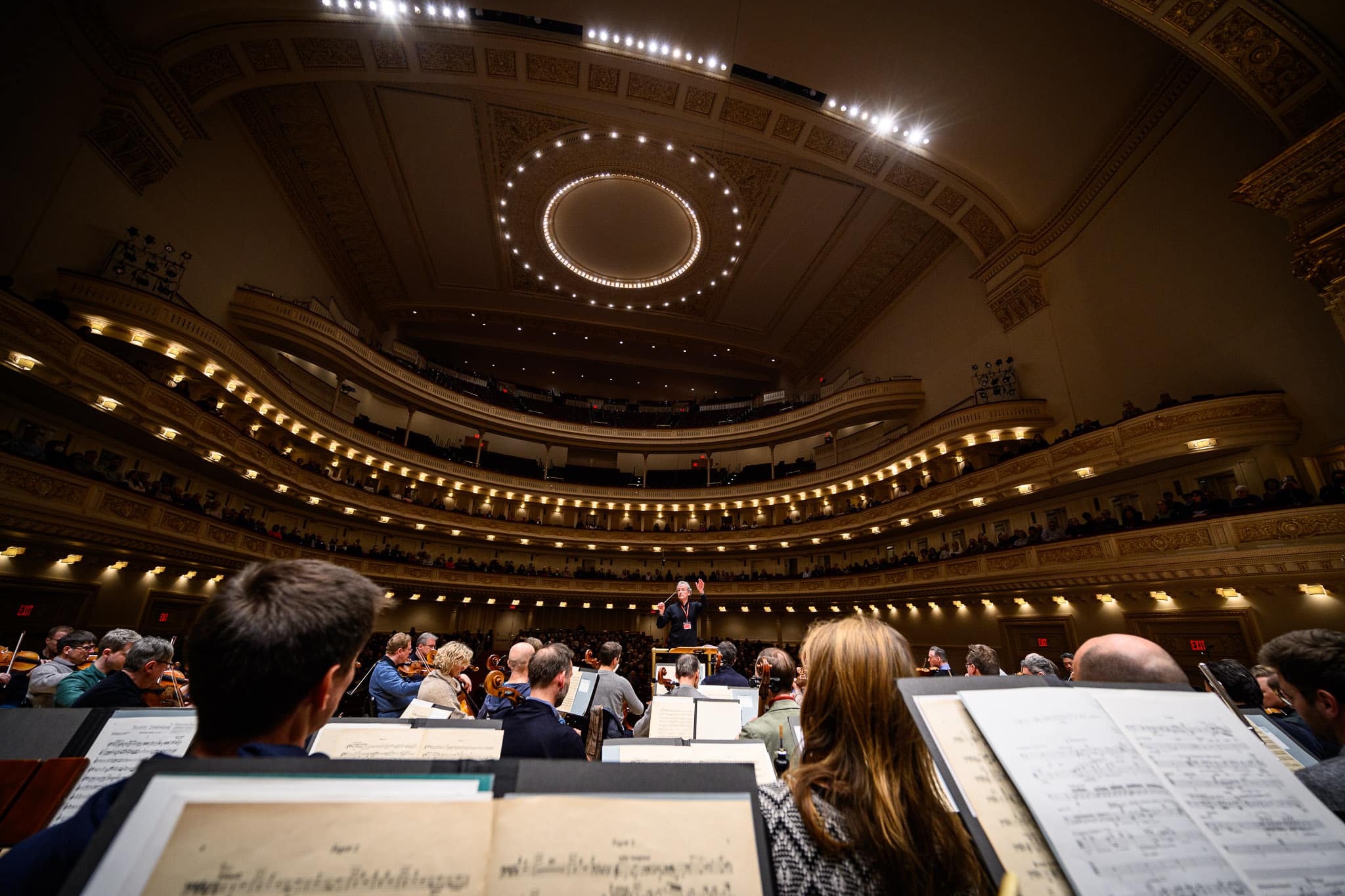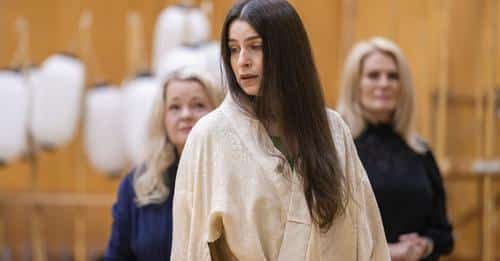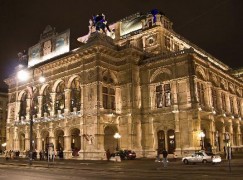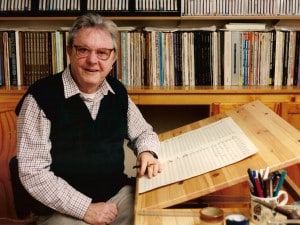So how was the Vienna Phil at Carnegie Hall? Still the best?
OrchestrasOur roving reviewer Susan Hall has emerged from a weekend’s immersion:
by Susan Hall
The Vienna Philharmonic occupied Carnegie Hall for a weekend of musical commentary on the Weimar Republic’s struggles with democracy. No orchestra has integrated democratic practices more thoroughly. Members of the orchestra control the choice of new members, of conductors and programming. They also determine the length of programs. At Carnegie Hall, each lasted just 90 minutes.
Bicentenarian Anton Bruckner inaugurated the first concert, balanced against Alban Berg. Bruckner would be prioritised by the Hitler regime while Berg was banned. In the Vienna Philharmonic performance of Bruckner’s three movement ninth symphony, the vibrant brass rang out. Chorales were magisterial. Abrupt climaxes were left to decay.
Decay is innate to Berg’s Three Pieces for Orchestra, Op. 6. Like other composers of his period, he tussled with tonality. Lovely melodies decay into dissonance. The old is held in new moments as a residue of a familiar past looking to a future: the heart of Weimar music.
Hindemith’s Konzertmusik for Brass Orchestra heralded the second program. Although brass and woodwinds held their customary positions at the back of the stage, conductor Franz Welser-Möst kept their presence very much forward. This complex piece for military marching bands is directed at the common man. Hindemith, the democrat, wished the ‘Volk’ to participate in high-end music. The performance was a blast.
Two dips into the future included Schoenberg’s Variations for Orchestra, which the Philharmonic took up with precision. Here Welser-Möst’s masterful musicality is demonstrated in the embedding of small elements. He does not clip endings. We are not left with bits and pieces. Instead they fold into the work, creating a uniform texture and we hear the composer’s intention more fully. This work is often claimed as a break with the past. Yet in using a 12 tone row, the composer gives us a truly decadent feeling.
Ravel’s Waltz ended the second program. Ravel, a World War I ambulance driver, may have driven nails in the coffin of the enemy’s Viennese waltz but the orchestra does not hold that against him. Its exuberance performance suggests an extension of the 3/4 waltz rhythm forever.
Mahler’s 9th symphony consumed the third concert. Welser-Möst showed just how delicate and moving the Philharmonic can be. It whispers, and can go silent for moments. If it occupies a space between life and death, it ends up affirming life.
Ninety minute programs leave you wanting more. On the other hand you wonder: What can follow the performance of Mahler’s Ninth Symphony?
Susan Hall






I was there for concerts one and three. First of all, if you want to hear how great the Vienna Philharmonic is, come to Carnegie Hall! Am I in a minority that thinks its acoustics are better than either the Musikvereinsaal (too reverberant, and remarkably dead in its upper reaches) or the Konzerthaus (too dry)? W-M doesn’t wear his heart on his sleeve, so Bruckner 9 and Mahler 9 were more to be admired for their unity, integrity and polish than for their emotional impact, which was still there, but perhaps not to the fullest possible extent. Referring to the earlier post about the rehearsal, I did not see 22 women on stage during either performance, leading me to wonder whether those were women from the Akademie, present in order to observe, participate in the rehearsals and back up the membership of the orchestra as needed. Incidentally, the players’ roster of the orchestra indicated that a few of them were members of the Opera orchestra but not of the Philharmonic, indicating a sort of probationary status.
I don’t find Carnegie better than the Musikverein (been there twice) or Symphony Hall in Boston (much better). As Earl Wild notes in his book “A Walk on the Wild Side” post renovation in 1986 the hall is too bright. There isn’t enough “room for the sound” when it gets really loud and it can be strident in major tuttis. It is still pretty good however. A “B” where Boston, Vienna, Detroit and Amsterdam are “A”s in my opinion.
John Kelly, Severance Hall in Cleveland also has way better acoustics than Carnegie.
I’ve been (twice) and I sat both upstairs and downstairs halfway back and while a bit better I wouldn’t say “way better.” Detroit is “way better………….take a trip and listen!
I haven’t been to Carnegie but I’ve been many many times to the Musikverein and Wiener Konzerhaus. The intimacy of the former makes it very special. For me the sound is excellent. 13 years ago I saw all the world’s leading orchestras there in a single year and I can tell you there’s not a ray of daylight between any of them in terms of quality.
In the absence of the Viennese Classics, it is utterly pointless to play well.
The Programs:
Note Salads and Big Yawns
Besides, visiting New York means becoming a living target on the streets.
Carnegie is no comparison to the MV Saal. The latter is spectacular. Carnegie is ok. But I have been blown away hearing the first few chord in Vienna but not in Carnegie, acoustic wise.
I was privileged to attend yesterday’s Mahler 9. Fully committed performance from every musician on the stage but Susan is spot-on, it was all about the whispering strings (especially the celli) who at times played just above inaudible yet still managed a full presence. Miraculous – a desert island experience. Thank you Vienna Phil and Welser-Möst (and Carnegie Hall)!
Wish I could have been there. My last M9 in Carnegie was Rattle/BPO and it was…okay. But not memorable.
Only one comment to make – sorry to disagree but, 90 minute programs are heaven. If I could count on 90 minutes with no intermission, I might very well return as a season ticket holder to my local (excellent) orchestra.
Agree and would only add that long-winded introductions by conductors ahead of the downbeat should be banned. You can get your fill of that sort of thing at pre-concert lectures.
And what about the suite from FRAU OHNE SCHATTEN that was part of the second evening’s program? To me, it was the highlight of the NYC concert season thus far.
Yes! I thought it was fabulously done. It’s not “great Strauss” as he extracted the suite from the opera. He probably could use the money. Nonetheless it is a wondrously over the top smorgasbord showing Strauss an absolute master of the orchestra. FWM and the VPO did it all magnificently. Agree this was the pick of all the performances this weekend for sure and possibly the season as I am wracking my brains to come up with anything more impressive.
I wouldn’t be so quick to praise the VPO’s “democratic practices.” Mature democracies also value equity and equal representation – qualities lacking in this still mostly white male orchestra. But as long as institutions like Carnegie or Rolex or PBS lend it their seal of approval, change will remain glacial at best.
It’s not YOUR change to make. Pay up or be quiet.
Fortunately the VPO hasn’t fallen for the mediocrities of DEI. I hope they can hold out and choose the musicians THEY want.
You are William Osborne and I claim my £5.
The proportion of women in German orchestras was 3% in 1960, 4% in 1970 and 39.6% in 2021. This trend will continue steadily and women will probably make up the majority in ten years’ time.
In 2006, a woman was admitted to the Vienna Philharmonic Orchestra for the first time; at the end of 2012, the proportion of women was around six per cent, and by 2022 it was already 16%.
There is a clear trend here, but it would be dangerous to try to influence this process.
And with regard to skin colour: I don’t know too many people of colour in Austria (or in the Austro-Hungarian-German cultural area) who play an orchestral instrument at a professional level.
Incidentally, I feel discriminated against by the fact that over 80% of players in the NBA are not white (the proportion of women is a scandalous 0%); a quota is urgently needed here!
Well, the VPO’s policy change occurred in 1997…so they’ve taken 25 years to get to just 16% or thereabouts? Most corporations would never stand for that kind of gender imbalance. And yes, there should be some quotas – both to ensure that it isn’t an old boys club and isn’t a white old boys club. It’s time they get with the 21st century.
Fortunately they do not need to obey your querulous commands.
In 1997, the Vienna Philharmonic decided to take on a female harpist due to a lack of suitable male applicants, but they only really opened up to women in the orchestra when violist Ursula Ruppe (née Plaichinger), who had been a member of the Vienna State Opera Orchestra since 2002, was accepted into the Vienna Philharmonic Association in 2007. In fact, it took 15 years to go from less than 1% women to 16%, which is not bad considering the small number of positions that become vacant every year. I don’t think the orchestra was or is misogynistic per se, but for a long time they endeavoured to maintain a tradition. In the meantime, however, it is probably a matter of course for all members of the orchestra to welcome women in all positions if they are suitable.
Nevertheless, Carl, a quota for women in orchestras can only be demanded by someone who has no idea about the process of filling positions in orchestras. How exactly do you envisage this? The tuba position is vacant and you only allow female applicants in order to increase the quota of women? And where exactly do you want to get non-white applicants from? Even in the USA, where the proportion of black citizens is significantly higher, there are hardly any black musicians in the orchestras, so where exactly are they supposed to come from in Vienna?
And regarding the “Old Boys Club”: there are now many young women in the ranks of the Vienna Philharmonic, and I’ll explain how it works: An orchestra member reaches the age limit and retires. The position is then advertised and there is an audition to which all sufficiently qualified applicants are invited, be they white, black, green, yellow, blue, male, female, diverse or whatever else there is. If the orchestra can agree on a candidate at the audition, that person is given the position for three years on a trial basis and hopefully confirmed after another vote. I actually don’t know how you could intervene in this process without undermining the orchestra’s autonomy. But I’m sure you have an idea!
PS: Isn’t a quota also discriminatory?
Susan Hall (as in other reviews posted here) describes the music while saying nothing meaningful about the performance. How is that music criticism? In Bruckner 9, “the vibrant brass rang out. Chorales were magisterial. Abrupt climaxes were left to decay.” Well, those comments apply to any decent orchestra playing Bruckner–because that’s how the music goes.
“Climactus interruptus”
When George Szell did Mahler 9 with Cleveland, the symphony was preceded by the Mozart Impresario overture and a Mozart piano concerto with Firkusny. In those days one got their monies worth !
Mahler never heard, let alone conducted, his 9th. Bruno Walter first conducted it. It usually plays much longer than these forces did and contrary to Susan Hall’s illogical writings, it is often paired with Mozart.
I went to all 3. FWM provocatively played the Berg 3 Pieces after the Bruckner 9 with no break other than to have the extra players run on stage (mostly percussion). While it was fun to see the hammer from Mahler 6 put to good use again, it was very much a case of a jarring auditory experience. I don’t know whether the intention was that the Berg was “where Bruckner might have ended up if he lived another 50 years” or not. The Bruckner was given a very fine performance. The Mahler 9 yesterday was too quick generally (75 mins), very well played, but with a finale coming in around 20 minutes (as opposed to Abbado, Bernstein and Sinopoli nearer 30) I found it a performance that did not take me on the emotional journey that that these other conductors have in the past. A real pity. I will say one thing – the strings are the 8th wonder of the world. Incredible intensity of tone. Almost like the old Berlin Phil with HVK………almost.
Berg preferred sleezy subjects in his operas and sleezy sounds in his orchestral three pieces; it was a territory he was well-acquainted with, given his private life where he structurally cheated on his wife and frequented brothels when unattended. (This is also how the music sounds.)
The idea that ‘music’ were to develop into ‘atonal Viennese School’ is part and parcel of modernist ideology and entirely nonsensical. It was a minor cult around Schoenberg who had cranky ideas about progress and theory:
https://wwnorton.com/books/9781631497575
Thanks – as you might tell from my comment, I found it unconvincing – sort of like having a wonderful dish of beef bourgignon followed immediately by chicken vindaloo………
Your privilege is showing
It was an analogy. I don’t eat beef bourgignon, though I am always up for a vindaloo, which presumably for you shows my colonial inclinations……….
nor do you spell it correctly …
Misspelling French is a British pastime
Beware the spelling and grammar police.
Good for him!!! I’m allowing it.
Comparing the VPO strings to the BPO is apples to oranges. The VPO strings have always had a distinctive sheen. The BPO generally has a darker sound, including at the strings. String experts may be able to point to more differences in character.
Not really apples to oranges – more like Gala apples to Fuji apples……….60 string players vs 60 string players. Certainly worth comparing but I agree with your comment that the VPO has a brighter sound in the violins…………………..
Don’t quite understand why it’s always necessary to bring up Hitler and the Nazis whenever the VPO or BPO, and particularly when they’re playing Bruckner, are concerned.
Yes, it’s a anglo-saxon klischee, to demonstrate again and again that ‘they’ were on the good side of history. While all people concerned are new generations. It’s a kind of mental grave digging as virtue signalling.
And it speaks of the modern Left: no sociological or economic imagination. Virtue signalling is narcissism; a low rent kind of kudos people garner for themselves with unearned outlay!! AKA cheap emotional ‘economics’.
You’re so right. I bet the UK school textbooks do not mention the antisemitic acts commited by British forces in Poland during WWII.
And we all know that when the actual real Nazis were in town, these types would not have been seen for dust.
But how were the concerts? They played well: this hardly a review of a concert. Also giving it was the WP which are famous to play extremely well (most of the time)
I went for the Mahler 9th. I was only able to get at ticket in the balcony row M. I was amazed at the quality and clarity of the sound up there. Usually these days I sit in the orchestra or second tier (my favorite) (more money worse knees made that possible). I thought it was a great performance. The last six minutes stayed with me the whole afternoon as I was walking in the park. At home I looked at the score and was again stunned by Mahler’s amazing orchestration. This was a beautiful Mahler 9th and I felt lucky to get these tickets (which I got last August btw).
Much better sound upstairs and as Stokowski said in those seats “you meet a better class of person.”
Indeed, more listeners and fewer watchers.
Susan is great in creative writing but short in musicological substance. She would be a fine writer of romantic fantasy novels.
She should feel at home in this site.
Bravo tutti! How fortunate we are to have great music in our lives!
I only attended the Bruckner / Berg concert and my opinion is more nuanced. The orchestra was too loud in Bruckner, and there were some sour notes in the woodwinds. I also missed that blended sound that Thielemann achieved in the same hall last year. And with Mr. T there was never the impression that the orchestra is too loud, even in a dumb piece like the Alpine Symphony.
BTW, a 90 minutes concert is ridiculous, especially at the asked ticket prices.
FWM looked visibly more aged, but thankfully has recovered from cancer. As others have discussed, he’s not the most insightful conductor.
But yes, the string sound was fabulous. And those horns…
Odd: 90 minute concerts?
Bruckner alone is about 1 hour and 10 minutes (depending on the conductor. Berg’s 3 pieces is at least 20-5 minutes long. It looks to me like well over 90 minutes.
Mr Ron, it was about 95 minutes. I was there. The tempi in the Bruckner were really good and it was neither rushed nor too slow. The Berg was done immediately after the Bruckner. FWM stayed on the podium and some players left and some more came on and he went right into the Berg. Provocative programming but I am unsure of the point being made.
I happen to enjoy intermissions. No need to hold things in.
I also don’t feel shortchanged.
The first concert in particular must have seemed rushed. Only the 2nd one is really possible.
It is easily possible to play Mozart and Mahler. The reviewer is simply wrong, as usual. The 3rd program would have left me feeling like I went to something on the cheap.
Why the need to rush everything today?
It seems to me that part of the allure of classical music is that it can be savored. No need for 90 minute rushed programs. NONE of the great interpretations of Bruckner or Mahler are fast.
I was at the Bruckner 9 and it was – meh. No tension, no arches. Boring throughout. And while I see why they added the Berg AFTER the 9th (as 4th movement under the auspices of the Weimarer Republic Festival) it didn’t work for me and destroyed the ending (which was rushed anyway). No comparison to G Wand’s performance.